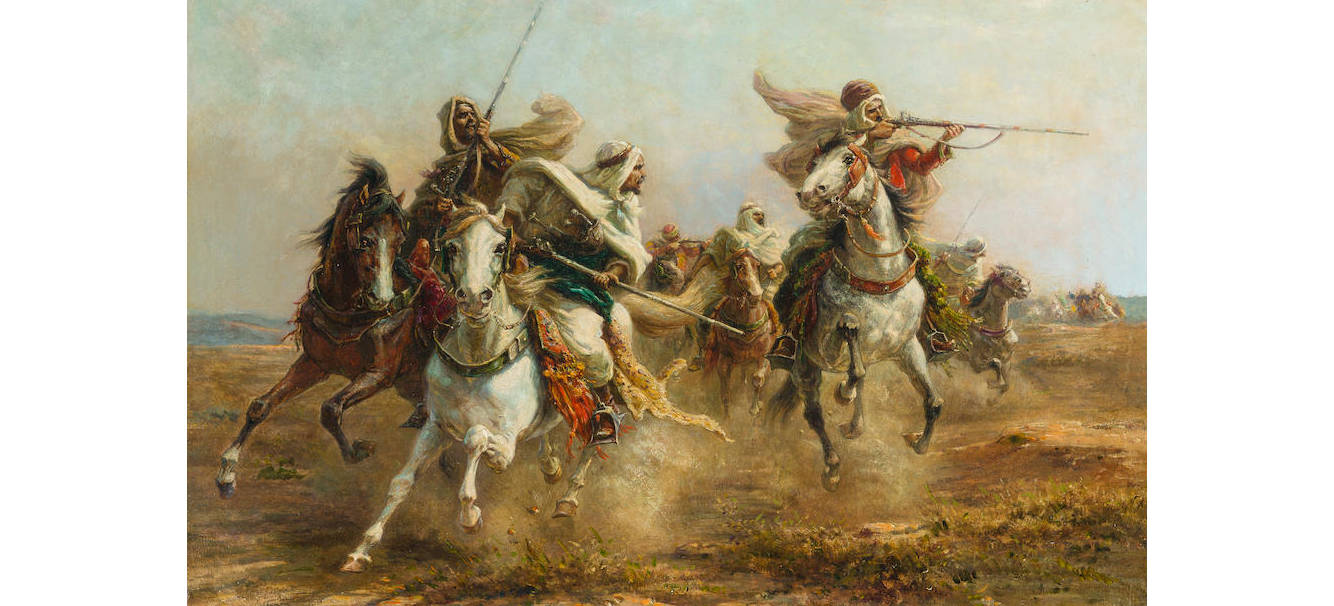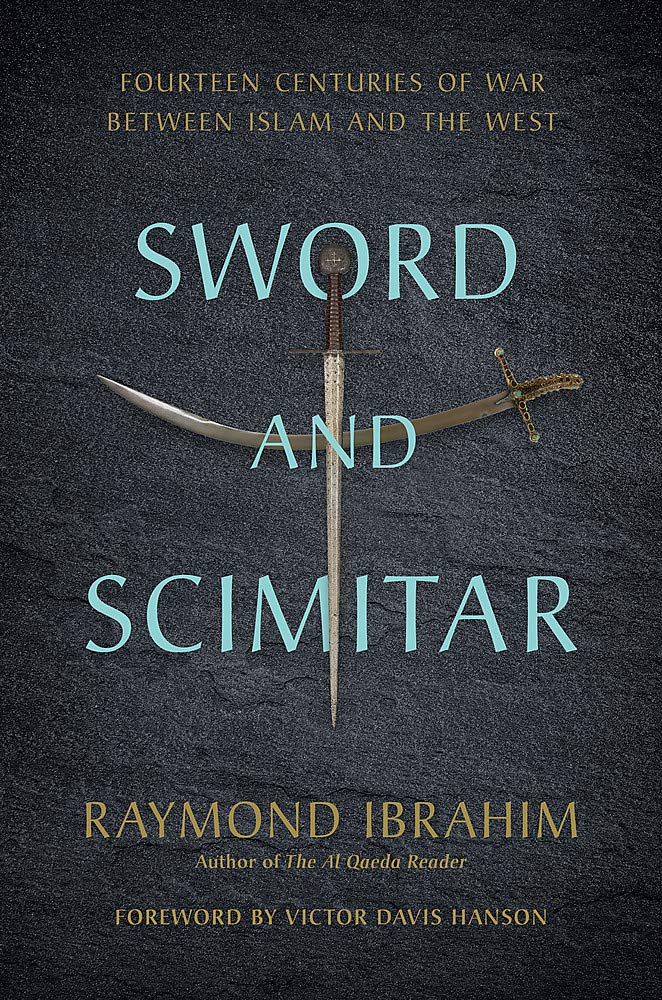History is about expansion and contraction – of ideas, of economics, of ambitions, and of the pursuit of power. A crucial element in this pulsation of human action is war.
Recalling von Clausewitz’s famous observation provides a meaningful framework for discussion: “We see, therefore, that War is not merely a political act, but also a real political instrument, a continuation of political commerce, a carrying out of the same by other means. All beyond this which is strictly peculiar to War relates merely to the peculiar nature of the means which it uses…War is the means, and the means must always include the object in our conception.”
Earlier, von Clausewitz defines war as, “an act of violence intended to compel our opponent to fulfil our will.”
Raymond Ibrahim actively engages with von Clausewitz in his latest book, Sword and Scimitar, by examining war as the fulfillment of the will of Islam. He looks at eight critical battles which marked how two worlds (one Moslem, one Western and Christian) view each other, down to the present.
Indeed, the encounters between these worlds stretch back more than a millennium, which means that Islam is not something new that suddenly burst into Western consciousness on and after 9/11. Rather, Islamic terrorism is part-and-parcel of a very ancient struggle which has expanded or contracted, sometimes favoring the West and sometimes giving the upper hand to Islam.
War in this context is to be understood as jihad, through which Islam subdues all those that oppose the will of Allah and the example of Mohammad. Ibrahim therefore defines jihad as, “warfare to spread Islam,” and quoting Emile Tyan, he explains that jihad must continue “until the whole world is under the rule of Islam . . . Islam must completely be made over before the doctrine of jihad can be eliminated.”
Here, the famous ideological two-fold division of the world, into the “House of Islam” and the “House of Faithlessness,” takes on its proper meaning. Moslems inhabit a reality which can never accommodate the Other, for to accept infidelity (kufr) as a viable way to live out a human life is the denial of Allah, and thus cannot be permitted. This gives the lie, of course, to those that would promote multiculturalism.
This outright rejection of the Other (termed the dhimmi), as unacceptable because he is innately hostile to Allah, renders no other outcome than continual conflict, until the Other is no more – either he is Islamized or annihilated. Here, the concept of the jizya is often trundled out (which is protection-money that non-Moslems must pay in order to live as second-class inhabitants inside Islamic territory).
But such a levy does not mean acceptance or accommodation of the Other. It simply means that each non-Moslem life is a “possession” of Islam, which yields monetary recompense. The dhimmi must pay to live. Ibrahim quotes from a Moslem jurist: “their [infidels’] lives and their possessions are only protected by reason of payment of jizya.”
At its core, therefore, Islam is a political ideology, constructed to change society into the House of Islam, governed by the laws of Allah and the example of Mohammad (Shariah). Accordingly, more than any other faith system in the world, it is the expansion and contraction of war, which defines the character and purpose of Islam.
Violence is not an evil that must be neutralized by way of love (as is the Christian view), in order to win peace. Rather, bloodshed and fear are necessary, and on-going, tools to bring about the end-game of Islam, which is the subjugation of the world. In this way, the practice of Islam in the world is radically different to the practice of Christianity – love produces a certain type of civilization; fear and violence produces another.
A serious problem in the West right now is the lazy habit of assuming that all religions are exactly like Christianity and are therefore to be “handled” in the same way. This is yielding destructive results.
This further means that Islam has always sought war, in order to vanquish its enemies, since such destruction is a holy act, which will meet with much reward in heaven. Thus, a Moslem who engages in jihad is termed a ghazi, or one who raids the territory of the faithless (the kafirs), and slays the unbelieving – because they are Allah’s enemies.
Thus, each Moslem should strive to be a ghazi. Shedding the blood of non-Moslems is meritorious, and much pleasing to Allah. As one Islamic chronicler states: “The Ghazi is the sword of Allah; he is the protector and refuge of the believers. If he becomes a martyr in the way of Allah, do not believe that he has died—he lives in beatitude with Allah, he has eternal life.”
This means that without war Islam loses not only steam but its very purpose, for the world outside Islam is to be changed through violence and the fear that the threat of violence produces. In the East, Islam was, and is, in contention with paganism.
In the West, it fights Christianity (even though the West is now more pagan than Christian). As Ibrahim observes, “Muslim armies went to war against the West more often as religious rather than as national or ethnic forces, and their warring against the Westerners was so seen as mostly a monolithic struggle against Christendom rather than particular European states.”
Thus, Islam exists to wage war in the world. The winning of territory is simply the consequence of this purpose. In the words of Mohammad, “I have been made victorious with terror.”
This means that a negative view of Islam (both in the East and in the West) is a historically grounded response to the violence inherent in Islam. It is not simply “racism” or Islamophobia (both these terms become useless in the context of jihad, by virtue of which each terrorist is a ghazi).
How opposing the violence of jihad can possibly be racism or Islamophobia is never properly explained by those who deploy such terms, especially when the similar opposition brings out the same negative response to Islam among non-Moslems in the East.
Ibrahim raises such crucial issues, which makes his book that much nuanced, for it is more than a richly textured presentation of military history. Although each battle is comprehensively analyzed and detailed, with much insight into the “construction” of terror by Islamic warriors, Ibrahim also uses the subject of war to lay out a social critique (of both Islam and the West), because war also builds an outlook, a point of view, a mindset.
It is a given that Islam as a religion enjoys sociopolitical protection by the Western elite. In this regard, Ibrahim raises a very fundamental point – Islam has never changed; it is still engaged in subduing the world for Allah, by following the example of Mohammad. The West, however, has changed, and in the process has entirely abandoned its own history. This has put the West in a position of weakness, in that it has gotten into the habit of appeasing the violence of Islam.
The Islamic mindset is the same as it was over a millennium ago. The best defense that the West can now muster is multiculturalism, borderless post-nations, relentless hedonism, and appeasement. This puts the West in a perpetual posture of weakness, for it can no longer thwart Islam’s will.
In this regard, Ibrahim ends his book with a dire warning: “…if Islam is terrorizing the West today, that is not because it can, but because the West allows it to.”
A little earlier, the words of Alan G. Jamieson are highlighted: “At a time when the military superiority of the West—meaning chiefly the USA—over the Muslim world has never been greater. Western countries feel insecure in the face of the activities of Islamic terrorists…In all the long centuries of Christian-Muslim conflict, never has the military imbalance between the two sides been greater, yet the dominant West can apparently derive no comfort from that fact.”
This paradox is easily understood, of course. Islam has not lost its will and still wants to impose it on the world. The West, on the other hand, no longer has a will of its own and therefore no longer understands what it is supposed to do in the world. The only thing it can offer is endless self-indulgence and the pursuit of pleasure. All the while, Islam pursues power. Who will win? Perhaps, Islam is the West’s wakeup call. But the problem now is – what shall the West wake up to?
Raymond Ibrahim’s book should be required reading for all those interested in understanding the future of Islam in the world. It would appear that the West no longer wants a future.
The photo shows, “Bedouins Taking Aim,” by Adolf Schreyer, date unknown.

